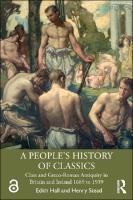A People's History of Classics
Proposal review
Class and Greco-Roman Antiquity in Britain and Ireland 1689 to 1939
| dc.contributor.author | Hall, Edith | |
| dc.contributor.author | Stead, Henry | |
| dc.date.accessioned | 2023-03-14T12:08:53Z | |
| dc.date.available | 2023-03-14T12:08:53Z | |
| dc.date.issued | 2020 | |
| dc.identifier.uri | https://library.oapen.org/handle/20.500.12657/61688 | |
| dc.description.abstract | A People’s History of Classics explores the influence of the classical past on the lives of working-class people, whose voices have been almost completely excluded from previous histories of classical scholarship and pedagogy, in Britain and Ireland from the late 17th to the early 20thcentury. This volume challenges the prevailing scholarly and public assumption that the intimate link between the exclusive intellectual culture of British elites and the study of the ancient Greeks and Romans and their languages meant that working-class culture was a ‘Classics-Free Zone’. Making use of diverse sources of information, both published and unpublished, in archives, museums and libraries across the United Kingdom and Ireland, Hall and Stead examine the working-class experience of classical culture from the Bill of Rights in 1689 to the outbreak of World War II. They analyse a huge volume of data, from individuals, groups, regions and activities, in a huge range of sources including memoirs, autobiographies, Trade Union collections, poetry, factory archives, artefacts and documents in regional museums. This allows a deeper understanding not only of the many examples of interaction with the Classics, but also what these cultural interactions signified to the working poor: from the promise of social advancement, to propaganda exploited by the elites, to covert and overt class war. A People’s History of Classics offers a fascinating and insightful exploration of the many and varied engagements with Greece and Rome among the working classes in Britain and Ireland, and is a must-read not only for classicists, but also for students of British and Irish social, intellectual and political history in this period. Further, it brings new historical depth and perspectives to public debates around the future of classical education, and should be read by anyone with an interest in educational policy in Britain today. | en_US |
| dc.language | English | en_US |
| dc.subject.classification | thema EDItEUR::N History and Archaeology::NH History::NHC Ancient history | en_US |
| dc.subject.other | Caractacus and Welsh nationalism;Caractacus and Welsh nationalists;Classical education and class;Classics and Class in Ireland;Classics and Communism;Classics and class;Classics and class in Scotland;Classics and class in Wales;Classics and the First World War;Classics and World War 1;Class and Classical Canons;Class in Britain to 1939;Communist Classics;classical curriculum;classical education in Britain;classical reception;classics and the working class;socio-economic class in Britain;Working-Class Classics | en_US |
| dc.title | A People's History of Classics | en_US |
| dc.title.alternative | Class and Greco-Roman Antiquity in Britain and Ireland 1689 to 1939 | en_US |
| dc.type | book | |
| oapen.identifier.doi | 10.4324/9781315446608 | en_US |
| oapen.relation.isPublishedBy | 7b3c7b10-5b1e-40b3-860e-c6dd5197f0bb | en_US |
| oapen.relation.isFundedBy | aed134bd-6b80-4746-b19c-e712e1ab2b20 | en_US |
| oapen.relation.isbn | 9781138212831 | en_US |
| oapen.relation.isbn | 9780367432362 | en_US |
| oapen.relation.isbn | 9781315446608 | en_US |
| oapen.imprint | Routledge | en_US |
| oapen.pages | 671 | en_US |
| peerreview.anonymity | Single-anonymised | |
| peerreview.id | bc80075c-96cc-4740-a9f3-a234bc2598f1 | |
| peerreview.open.review | No | |
| peerreview.publish.responsibility | Publisher | |
| peerreview.review.stage | Pre-publication | |
| peerreview.review.type | Proposal | |
| peerreview.reviewer.type | Internal editor | |
| peerreview.reviewer.type | External peer reviewer | |
| peerreview.title | Proposal review | |
| oapen.review.comments | Taylor & Francis open access titles are reviewed as a minimum at proposal stage by at least two external peer reviewers and an internal editor (additional reviews may be sought and additional content reviewed as required). |

